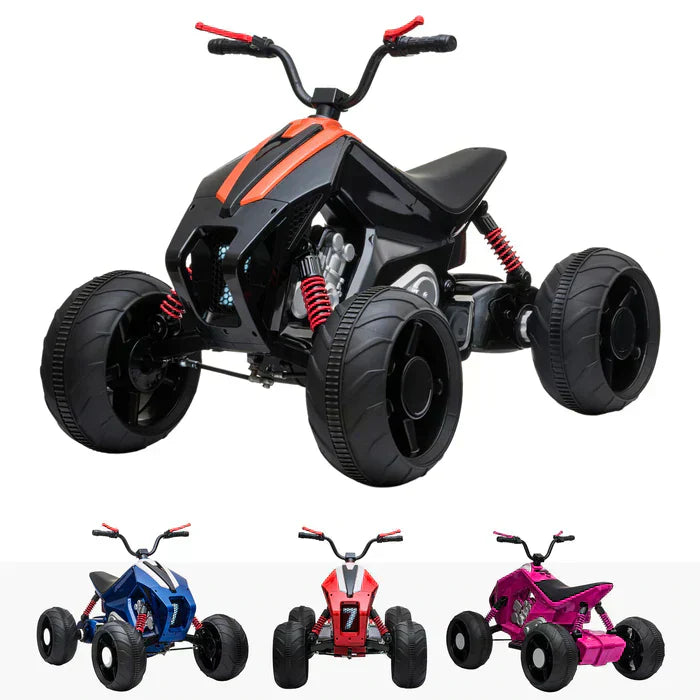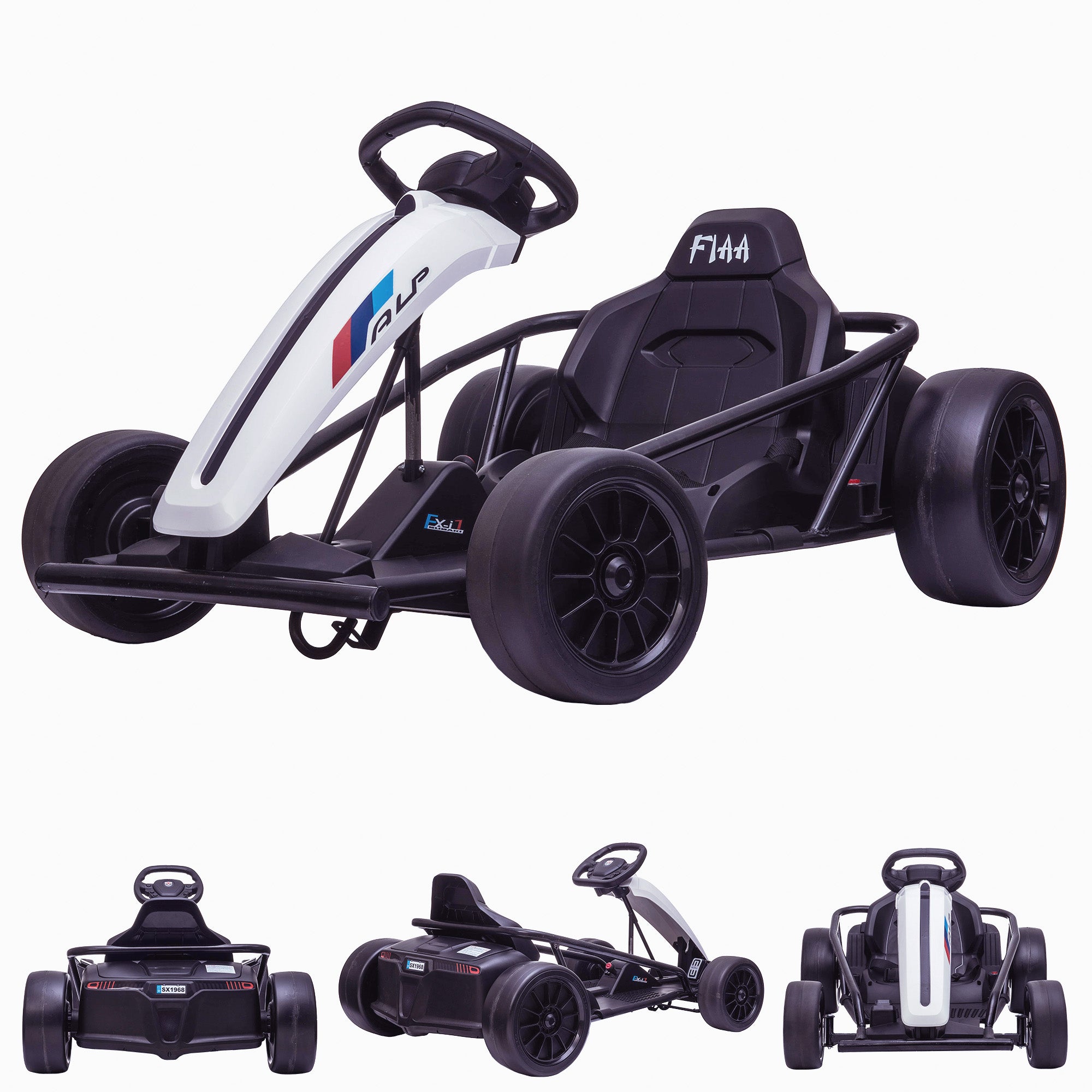The Fastest Kids’ Ride-On Cars of 2025: Speed, Safety, and Fun!
Published: May 9, 2022 | Updated: March 20, 2025
Rev up the excitement! Whether your little driver craves speed or you’re after a safe ride-on toy, our guide to the fastest kids’ ride-on cars has you covered. From 6V starters to 48V beasts, we’ve rounded up top picks that blend thrilling performance with parent-approved safety. Ready to roll? Let’s dive in!
What Are the Fastest Kids’ Ride-On Cars?
Kids’ ride-on cars range from 6V to 48V, with speed increasing alongside voltage. For beginners around 5 years old, a 6V model zips along safely at 2–3 mph. Older kids ready for more power can handle 24V or 36V options, reaching up to 10–15 kph. Safety’s baked in—most brands over-engineer these toys for peace of mind. Here are our fastest picks!
RiiRoo Super Sport XL: The Ultimate Speed Machine
Meet the RiiRoo Super Sport XL 24V 2-Seater—our fastest ride-on yet, hitting 5–15 kph depending on weight and terrain.
- Voltage: 24V
- Speed: 5–15 kph
- Colors: Cherry Red, Hot Pink, Painted Grey
- Seats: 2
Upgraded from our best-selling one-seater, this two-seater is perfect for siblings or playdates. Shop now and let the races begin! (Note: Shades may vary.)
RiiRoo MaxDriftz™ Electric Go Kart
The RiiRoo MaxDriftz™ 2x12V Electric Go Kart blends speed with drift-ready fun.
- Voltage: 2x12V (24V total)
- Speed: Up to 7 mph
- Features: Drift capability
Perfect for kids who love a thrill. Get yours today! Curious about toddler options? See our Best Ride-On Toys for Toddlers.
RiiRoo MaxDriftz™ 750: Drift Like a Pro
The RiiRoo MaxDriftz™ 750 24V Drift Go Kart takes drifting to the next level.
- Voltage: 24V
- Speed: Up to 10 mph
- Power: 750W motor
Faster and driftier than its predecessor, this kart’s a staff favorite. Grab it now! Learn more in Is Drifting Good for Speed?
McLaren 24V Drift Kart: Supercar Vibes
The McLaren 24V Drift Kart brings iconic design to the track.
- Voltage: 24V
- Speed: Up to 8 mph
- Features: Authentic McLaren styling
Perfect for kids dreaming of the racetrack. Shop now!
CyberQuadee 24V Electric Quad: Off-Road Ready
The CyberQuadee 24V Electric Quad tackles any terrain.
- Voltage: 24V
- Speed: Up to 7 mph
- Features: 4-wheel suspension, electronic clutch
Ideal for upgrading from smaller quads. Get it here!
UTV MX MaxPow™ Ranger 3: Tough and Fun
The UTV MX MaxPow™ Ranger 3 delivers power and durability. (Note: Listed as 12V in link but 24V in text—assuming 24V based on context.)
- Voltage: 24V
- Speed: Up to 6 mph
- Features: 2x200W motors, 2 seats
Perfect for off-road adventures. Shop now!
Are They Safe at These Speeds?
Yes! 99% of RiiRoo ride-ons feature:
- Safety Belts: 3- or 5-point harnesses
- Parental Remote: 2.4GHz control
- Speed Limiters: Adjustable settings (e.g., 6V: 2–3 mph, 24V: 6–7 mph)
- Emergency Stop: Instant halt option
Durable materials keep kids secure and comfy.
What Makes Them Go Faster?
Technical Factors
- Voltage: Higher volts = more speed
- Motors: Dual or brushless motors boost power
- Terrain: Smooth surfaces maximize performance
Maintenance Tips
- Charge every 2–3 weeks
- Avoid overcharging
- Store in a cool, dry place
| Age & Weight Guide | |||
|---|---|---|---|
| Age | Type | Weight Limit | Benefits |
| 6-18 Months | Push Toys | 20 kg (44 lbs) | Motor skills |
| 2-3 Years | 6V Cars | 25 kg (55 lbs) | Coordination |
| 3-8 Years | 12V Cars | 30 kg (66 lbs) | Safe fun |
| 7-11 Years | 24V Cars | 35 kg (77 lbs) | Advanced skills |
FAQs About Fast Ride-On Cars
How fast do they go?
6V: 2–3 mph; 12V: 4 mph; 24V: 6–7 mph; 36V+: up to 10–15 mph.
Are they safe?
Yes, with belts, remotes, and speed limits. Look for EN71 certification.
What age are they for?
1–3 years: 6V; 3–5 years: 12V; 5–9 years: 24V+.
Rev Up the Fun! 🚗💨
Obsessed with speed? Explore more at RiiRoo.com or chat with us live for instant toy tips!
Shop Ride-On Cars Now











Share:
Ride-On Car Remote Control Not Working
All You Need to Know About Kids Petrol Go-Karts